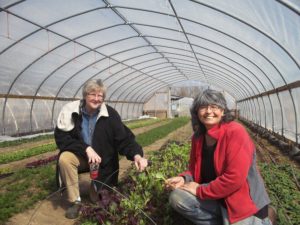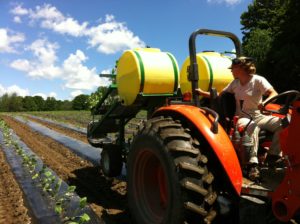How to Love a Farmland Lease
Strengthening the landowner-farmer relationship with leasing and stewardship.
Sustainability, simply stated, is the capacity to endure. But the high cost of land in Vermont, combined with the financial challenges of owning land, are threatening the sustainability of local agriculture. According to Vermont’s Farm to Plate Strategic Plan to strengthen the food system, “Affordable access to farmland was described [by stakeholders] as a serious barrier for new farmers or those seeking to grow and expand.” In other words, productive farmland is imperative if Vermont is to increase its local food access and consumption.
“It could appear there is plenty of rural land in Vermont, but the agricultural land is largely inaccessible to new farmers,” says Garland Mason, the new farmer coordinator at Rutland Area Food and Farm Link (RAFFL). “The price of land is often prohibitive and the difficulty in finding a piece of land that fits farming needs can stop new farmers in their tracks. For these reasons, leasing farmland is often the best option for start-up farms.”
Happily, more and more farmers are leasing land from second home owners, retired farmers, and family-owned farm partnerships. And organizations have sprouted up to help foster and manage these relationships. Landowners who, a decade ago, might have looked out onto a fallow field now have the opportunity to see an active farm from their windows.
“There are many non-farming landowners who have inherited or purchased Vermont farmland without intentions of farming on their own,” Garland says. “These landowners may find that it becomes expensive and inconvenient to have the land hayed or brush hogged each year, and instead may consider leasing land to new farmers who work to keep the land open and the soils in good health.”
Carol Tashie and Dennis Duhaime of Radical Roots Farm, an organic vegetable farm located in Rutland, have leased two acres of land from Mary Ashcroft since 2010. Originally sub-leasing, Carol and Dennis transitioned into a direct lease with Mary and her now late husband, Harold Billings, a former dairy farmer who was glad to see his land being repurposed.
“Our farm has been in the Billings family since 1817,” Mary says. “We respect the relationship between people and the land. By leasing out different parts of the land for farming—both organic and conventional—and for other compatible uses, I hope to encourage balance and stewardship.”
The lease relationship was informal at first but easily moved into a formal agreement, thanks in part to Mary’s background as a lawyer. Both casual on-the-farm conversations and formal meetings structured the relationship. “Good communication among those farming and those leasing is important—we stay in touch regularly,” Mary notes. The lease includes cash payments and a CSA share for Mary.
“To grow local food access in the state we need more land, and landowners leasing to farmers is one of the best ways to ensure food sovereignty,” Carol says. “Dennis and I made a conscious decision to not buy land and to be better stewards by putting money into the land rather than a mortgage.” Radical Roots Farm sells veggies at the downtown Rutland Farmers’ Market, the Rutland Winter Farmers’ Market, and through CSA farm shares.
Mary also has lease arrangements with other agriculture businesses, including a conventional corn farm, a sugarbush, a horse farm, a nursery, and a developing forestry product business—all viable solutions to keeping an old dairy farm active in a working agricultural landscape.
Mary and Carol recently shared their story at a “Lease Your Land to a Farmer” workshop presented by Land For Good, the UVM Center for Sustainable Agriculture, and the Vermont Land Trust.
Mike Ghia, the Land For Good field agent for Vermont, says farmer-landowner matchmaking is not unlike the process of dating before getting married. “Exploratory relationships teach about what each party is looking for before entering into a marriage.
Likewise, a property owner may interview and meet with a number of farmers before they find someone who shares the same goals, with whom they are compatible, and helps determine if each want to pursue the lease relationship. Property owners shouldn’t be discouraged if some of the farmers they connect with don’t meet their expectations or even if a past leasing relationship with a farmer didn’t work out. Instead, it’s important to look at these interactions as learning experiences that can help inform a better, successful relationship in the future when the right farmer comes along. The same can be said for farmers looking to find the right property owner from whom to lease.” Land For Good is a New Hampshire-based nonprofit that educates and assists people throughout New England on farmland access, tenure, and transfer.
Matchmaking between farmers and landowners can begin informally, or by completing an online profile and searching applicable websites like VermontLandLink.org in Vermont or NewEnglandFarmlandFinder.org for New England.
Landowners interested in exploring lease arrangements also need to obtain baseline knowledge of their property in order to provide the necessary details in a matchmaking description. They must know their land’s soil type, consider housing options for a leasing farmer, evaluate barns and outbuildings, and estimate water availability.
Land For Good highly encourages mutually beneficial, written lease agreements. Stewardship clauses that state expectations around the care and management of natural resources over a long period of time are strongly advised, as are leases sustained over a broader time frame than just a few years. It’s also recommended to have a dispute clause that requires disputes to be handled through mediation, including through services such as the Vermont Agricultural Mediation Program, or similar programs found in other states. Include who’s responsible for property repairs, alterations, and improvements to structures, and state that insurance liability is maintained by the farmer and includes property owners in the policy. (Standard homeowner insurance policies do not cover leased farming.) Land For Good provides direct technical assistance to both property owners and to farmers on working through and understanding these and other farm leasing issues.
Benefits should also be clearly understood. Property owners benefit by receiving land maintenance and stewardship, lease payments, business partnerships, and potential property tax discounts. Farmers benefit by having workable land and clear expectations.
Connect with Resources
- To learn about farmland leasing, to attend a workshop, or to obtain a copy of “A Landowner’s Guide to Leasing Land for Farming” visit.
- To find a farmer or farmland visit newenglandfarmlandfinder.org and vermontlandlink.org.
- To learn more about Vermont’s ten year food system plan, visit vtfoodatlas.com.
Additional article mentions include
Sally Mole owns Cedar Hill Farm, a 350-acre, family-owned farm partnership in Pownal, which encompasses tenants Mighty Food Farm and Quarry Hill Farm. Sally grew up on the farm when it was raising beefalo in the 1950s and ‘60s, but challenges bringing beef to market led Sally’s father to quit farming. She eventually faced the reality that money could not be made farming in her situation, so she began promoting small farms and farm products while exploring new avenues of entrepreneurship.
Sally now partners with Quarry Hill Farm to raise sheep, sold through Vermont Lamb Company. Quarry Hill also taps the sugarbush and, as longtime tenants, have created a home- school enrichment program on the property. Mighty Food Farm rents farmhouse space and grows organic produce for 250 CSA shareholders; they also sell at local farmers’ markets. Echoing Carol Tashie’s reasoning for leasing, Sally says her farm tenants find leasing appealing because it’s more about “building cash equity and not putting all that money into land ownership costs.”
“Our nine shareholders [in the farm partnership] have talked about selling to current lessees,” Sally says, “but in all reality, that asset split really doesn’t amount to much—and at what cost to local land access for our future generations? We had to look at the possibilities of what could happen to the land if a new owner sells. We began to consider the longevity of land access to pass on to future generations as a family-run real estate leasing operation, instead of a family farm.
“Our farming model has helped encourage other small farms along the road,” she continues, “making this valley into a vibrant farm community—a fabric of life unraveling a new farming pattern based on food access for future generations, not simply monetizing the land. This model took work, time, and cost to repair buildings and prepare the land, but this year we plan to pay out a dividend [to partnership shareholders], and hopefully for subsequent years to follow.”
Sustainability is the capacity to endure. And food access is critical to our ability to endure. Yet as Rutland landowner Mary Ashcroft says, “The pressure is on prime farmland. Farmers want to use it, as do developers for housing and solar projects, and transportation planners for road projects.” Hope lies with the multiple organizations addressing this pressing issue, and with all the landowners willing to work with farmers to help Vermont achieve the twin goals of preserving land and growing more local food.




My wife has farmland that she wants to lease for organic farming. The farmland is located in Woodburn, KY. It’s around 25 acres. Can you point us in the right direction on what to do? Thank you.
Jerry
ATL